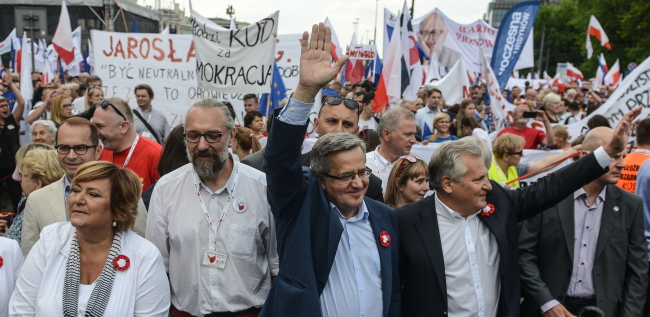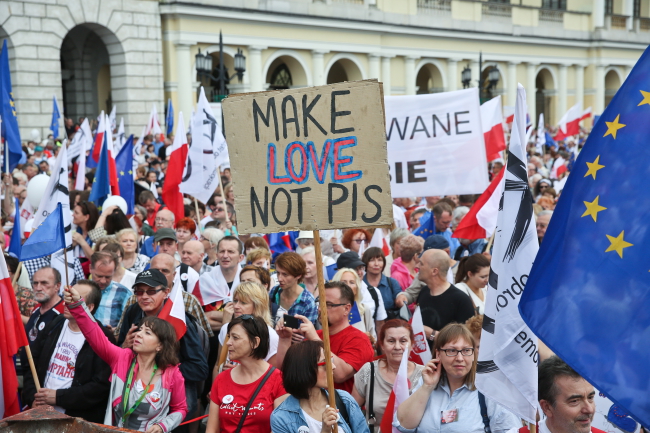The protesters marched under the slogan "Freedom for Everyone, Everyone for Freedom" in memory of the historic ballot of 4 June 1989, which paved the way to democracy and a free-market economy after four decades of communist rule.
The anniversary offered an opportunity to reflect on the current state of democracy in Poland, which, critics say, is under threat under the conservative Law and Justice cabinet. The rally was organised by the Committee for the Defence of Democracy (KOD), which opposes sweeping reforms the ruling party has pushed through since coming to power in October.
"To those who were born after 4 June 1989 freedom is like the air we breathe − we've become used to it and take it for granted until it is under threat," the head of KOD, Mateusz Kijowski, told the crowds. "We have come here today to demonstrate how important liberty is to us all."

KOD chief Mateusz Kijowski (2L), former president Bronisław Komorowski (2R) and his wife Anna (L), former head of state Aleksander Kwaśniewski (R) attending a pro-democratic march in Warsaw. Photo: PAP/Jakub Kamiński
Former heads of state Aleksander Kwaśniewski and Bronisław Komorowski, attended the protest, marching alongside opposition leaders and communist-era activists including Władysław Frasyniuk and Krzysztof Łoziński.
"This is a beautiful rebellion," former president Bronisław Komorowski said in his address, alluding to a comment by Law and Justice leader Jarosław Kaczyński. Speaking at a congress of PiS's local branch on Saturday, the party chief referred to opposition to the government's sweeping reforms as "a rebellion".

Photo: PAP/Rafał Guz
Police put the number of protesters who turned up at the starting point of the march, at Bankowy Square, at 10,000. Warsaw City Hall, however, put the figure five times higher.
Demonstrations, marches and pickets were also held in a number of other Polish cities as well as abroad throughout the day.
Saturday's rallies were the latest in a series of protests staged by KOD against changes carried out by Poland's conservative government. Since coming to power in last October's elections, the Law and Justice party has pushed through major overhauls of the country's top court, public media, the civil service and surveillance laws.
The reforms have sparked an outcry from critics who say the changes violate democratic values and principles - accusations which Law and Justice dismisses. (aba/pk)
Source: PAP, IAR